Bibliothèque
Toutes les ressources
1881 – 1900 sur 2626 résultats

Cash Transfer Program in Northern Syria
Report
Humanitarian needs, both in Syria and neighbouring countries (Lebanon, Jordan, Turkey and Iraq), have rapidly increased since the beginning of the conflict. The Aleppo governorate, as one of the county’s most populated areas with a total population of 4,670,000, has suffered from the consequences...

Contrat de prestation de service
Guides et outils
CONTRAT DE PRESTATION DE SERVICE DE PAIEMENT EN MASSE
(Paiements de l’entreprise vers le client)

Financial Services Primer for Humanitarians
Guidelines and Tools
Financial services facilitate a wide range of economic and households activities in any society. They enable trade and business expansion and allow individuals to save, send and borrow money. Humanitarian cash transfers, particularly when delivered electronically,can expand access to financial services...
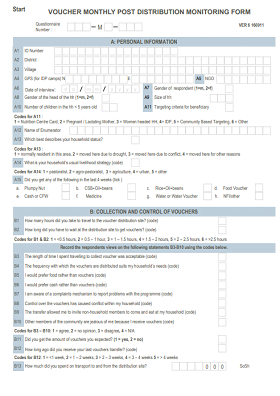
Voucher Monthly Post Distribution Form
Report
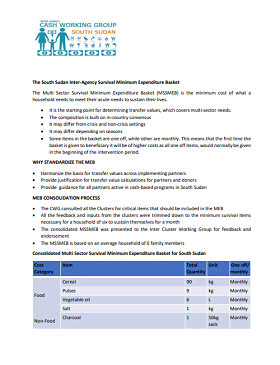
The South Sudan Inter-Agency Survival Minimum Expenditure Basket
Report
The Multi Sector Survival Minimum Expenditure Basket (MSSMEB) is the minimum cost of what a household needs to meet their acute needs to sustain their lives.
• It is the starting point for determining transfer values, which covers multi-sector needs.
• The composition is built on in-country consensus

Cash Transfer Programming for Syrian Refugees: Lessons Learned on Vulnerability, Targeting, and Protection from the Danish Refugee Council’s E-Voucher Intervention in Southern Turkey
Report
DRC Turkey is currently implementing a two-year, DFID-funded project that aims to provide immediate support to and strengthen the coping mechanisms of vulnerable non-camp Syrian refugees in southern Turkey. The first phase of the project focused on identifying and providing monthly cash transfers (in the...

Cash in Emergencies Toolkit
Guidelines and Tools
Access Toolkit Here Cash transfer based programming (CTP) is an effective and flexible way to support people affected by emergencies, maintaining their dignity and choice, while fostering local economies. CTP includes all forms of cash and voucher-based assistance. The Cash in Emergencies Toolkit has been...
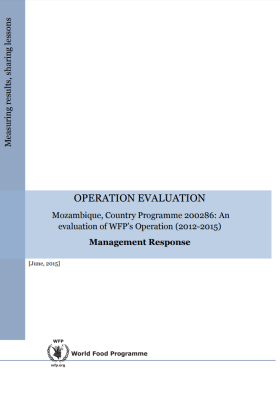
Mozambique, Country Programme 200286: An evaluation of WFP’s operation (2012-2015) – Management Response
Report
The final evaluation covers WFP’s country programme (CP) 200286 (2012-2015). It was intended for both accountability and learning purposes and focuses on assessing: the appropriateness and coherence of the operation its results the factors explaining the results. The evaluation assessed the...

Household Cash Transfer Assessment – Typhoon Haiyan Recovery Response
Report
An estimated 16.1 million people were affected by typhoon Haiyan, with 1.1 million damaged or destroyed homes and as many as 4.1 million people displaced – nearly four times as many as those left homeless by the 2004 Indian Ocean tsunami. At least 6,300 people lost their lives and another 5.9...

Rapport de l’atelier d’apprentissage " Être prêt pour les transferts monétaires"
Guides et outils
Malgré une évolution rapide et dynamique de la mise en oeuvre des transferts monétaires en Afrique de l’Ouest, le manque de préparation des acteurs ne permet pas l’optimisation du potentiel de la modalité. Ainsi, l’échelle des interventions demeure limitée, la combinaison de modalités...
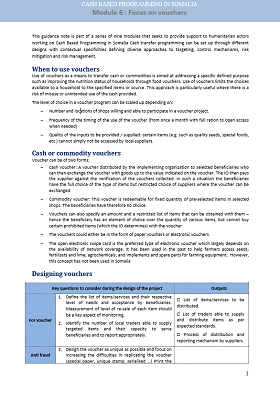
Cash Based Programming In Somalia – Module 6: Focus On Vouchers
Report
This guidance note is part of a series of nine modules that seeks to provide support to humanitarian actors working on Cash Based Programming in Somalia Cash transfer programming can be set up through different designs with contextual specificities defining diverse approaches to targeting, control...

The Impact of Cash Transfer Programmes on Protection Outcomes in Afghanistan
Report
Although cash-based interventions (CBIs) are increasingly used to deliver humanitarian assistance in support of more traditional in-kind emergency distributions, there is now a growing, global acceptance among stakeholders of the need to pay closer attention to the positive and negative impact of CBIs on...
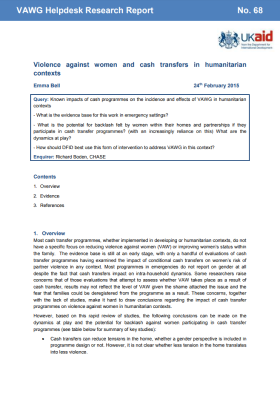
Violence Against Women and Cash Transfers in Humanitarian Contexts
Policy paper
This report addresses the known impacts of cash programmes on the incidence of violence against women in humanitarian contexts. Query: Known impacts of cash programmes on the incidence and effects of VAWG in humanitarian contexts What is the evidence base for this work in emergency settings? What is the...

Remittances to Syria: What works, where and how
Report
This study sought to understand remittance flows into Syria, and established that various Informal Value Transfer Systems (IVTS) are used, to the exclusion of the formal banking sector. Registered and unregistered hawala, courier services and family connections are used. Remittances have played an...
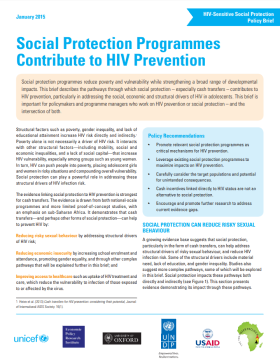
Social Protection Programmes Contribute to HIV Prevention
Policy paper
Social protection programmes reduce poverty and vulnerability while strengthening a broad range of developmental impacts. This brief describes the pathways through which social protection – especially cash transfers – contributes to HIV prevention, particularly in addressing the social, economic and...

Markets in Crises: The 2010 Floods in Sindth, Pakistan
Case Study
Floods in Pakistan in 2010 inundated a wide swath of territory, affecting 18 million people and killing approximately 2,000. The disaster also affected businesses, from some of the largest factories and most fertile agricultural land in the country to small village shops. Many businesses closed, either...
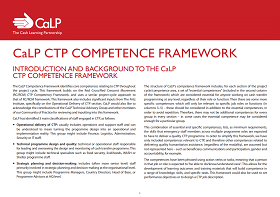
The CALP Network CTP Competence Framework
Guidelines and Tools
The CALP Network Competence Framework identifies core competences relating to CTP throughout the project cycle. This framework builds on the Red Cross/Red Crescent Movement (RC/RCM) CTP Competency Framework, and uses a similar project-cycle approach to that of RC/RCM framework. This framework also...
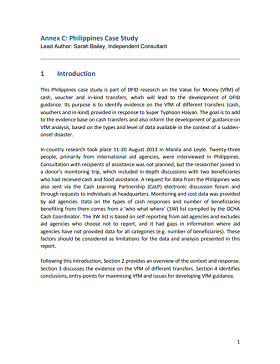
Annex C: Philippines Case Study
Report
This Philippines case study is part of DFID research on the Value for Money (VfM) of cash, voucher and in-kind transfers, which will lead to the development of DFID guidance. Its purpose is to identify evidence on the VfM of different transfers (cash, vouchers and in-kind) provided in response to Super...
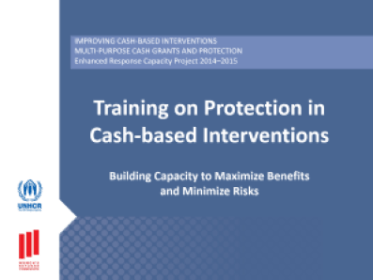
Protection in Cash-based Interventions Training: Building capacity to maximize benefits and minimize risks
Guidelines and Tools
This participatory curriculum is based on the inter-agency Guide for Protection in Cash-based Interventions (CBIs). The one-day training provides practical instruction for analysing and monitoring protection risks and benefits in CBIs. Slides, facilitators’ guide, case studies, and other materials for...
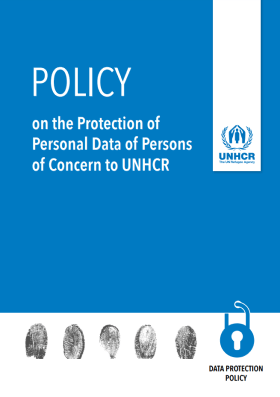
Policy on the Protection of Personal Data of Persons of Concern to UNHCR
Policy paper
This Policy lays down the rules and principles relating to the processing of personal data of persons of concern to UNHCR. Its purpose is to ensure that UNHCR processes personal data in a way that is consistent with the 1990 United Nations General Assembly’s Guidelines for the Regulation of Computerized...